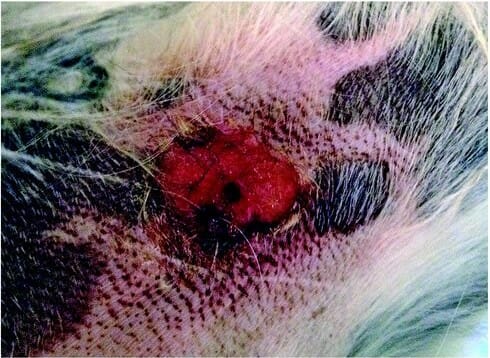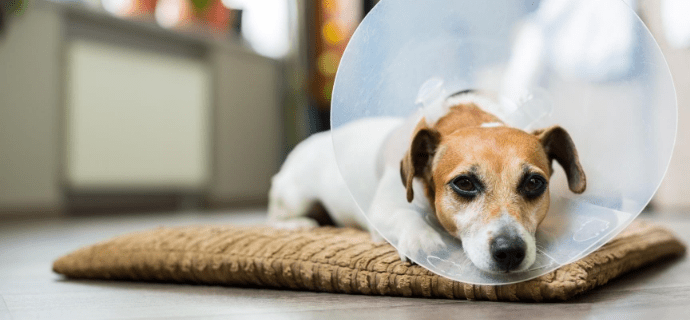Alabama Rot First-Hand Advice

This is a very good explanation & good advice from someone whose dog died from Alabama Rot. We’ve not heard some of the information before, so feel it was worth sharing. With many thanks to Andrew Paterson for allowing people to share.
Dear All
As some of you will know, we have just lost our beloved dog to Alabama Rot. It’s not how you would wish any dog to end their journey. We moved her to a specialist hospital near Winchester, but yesterday we had to let her go. The vets in that clinic (Anderson Moores) are the only UK specialists on this disease, and although nothing can now help S****, I am writing to all of you in case this information will help your own dogs, or any dog.
We spent a long time with one of their AR vets, who explained that there is a huge amount of mis-information out there about this disease, and most of the “facts” you hear bandied about are just guesses. They also feel it is under-reported to the tune of maybe tenfold, partly because some dogs are not taken to the vet or because vets fail to identify it correctly, or the deaths are just attributed to kidney failure etc. AR usually requires post-mortem biopsy to be 100% sure of the diagnosis. Not everyone is willing or able to pay for their dog to be treated, or to have a post-mortem, even though this helps the wider dog community. If a dog is not insured, costs are pretty steep and even if they are insured, you can easily pass the limit depending on your policy. So, the problem is bigger than people realise and seems to be increasing. There have been several suspected cases even at our local vets and Anderson Moores are seeing more and more victims from pretty much all parts of the country.
The bad news is that survival rates are very low, and we understand so little about it. The key thing is that it only affects a tiny minority of dogs – those whose bodies start an incorrect immune response, like an auto-immune reaction but this is an immune-mediated reaction – similar outcome, the body does the wrong thing in response to the infection. In our case, for example, the other dogs walked in exactly the same muddy fields as S**** are fine as are dozens, hundreds of dogs walked in the places where only one dog falls victim. The fact of where a dog “caught” it is a bit of a red herring, rather like MRSA on humans, which is usually brought into hospital on the skin of the patient. No need to go into exactly how the body goes wrong in cases of AR but it causes the dog to develop kidney and liver failure, inability to produce platelets or to clot the blood. The lesions visible on the dog’s skin are also doing their work in the kidneys and elsewhere. So, by the time even the most vigilant owner sees a lesion, chances are that there are more inside on internal organs – but if not, then you may yet have a good chance.
Obviously, this is hideous news for the unlucky few, but I stress that they are only a few. It is not contagious. Our other dogs are alive and well, having shared beds, water bowls, dead rabbits with S****. Alabama Rot is very different from leptospirosis (though can initially manifest in similar way) so the idea of “catching” it is less of an issue. It is more what on earth you do if you think your dog has developed it. Anderson Moores have saved dogs with AR but in those cases the dogs had only lesions, not any damage to kidney or liver. There is a lack of evidence to say categorically that those dogs would or would not have gone on to develop organ failure without treatment, but that is the other point. There is not really any “treatment” for AR in the sense of simply getting the right antibiotic, because what kills your pet is not the disease so much as your dog’s reaction to the pathogen. The treatments consist of supporting the body to try and get it to the point where it can start to heal itself. A plasma transfusion, for example, is often done early on (S**** had this very early, at the local vet) but the effects wear off very quickly and the dog either can or cannot make its own platelets after a certain point, some of them do and recover and go on their merry way. It makes no difference the age of dog, the breed or the sex. Some bodies just react badly and keep doing so, others do not.
I guess my main message is to keep enjoying muddy walks. It seems bonkers that dogs up and down the land are being kept off certain fields or woodlands when so little is known. Similarly, the advice to wash your dog after walking is controversial because constantly wetting the skin is a great way to get bacteria into the bloodstream. My personal advice would be to keep enjoying all your usual walking places but be hyper vigilant for the smallest sign of a lesion regardless of where you walk. Or even the dog being just listless or losing appetite. The first I knew that S**** was ill was that on Friday morning she did not want breakfast and co-incidentally had a strange patch of furless skin on a paw, like a cut. It soon looked much nastier and she was being sick, but I now realise that by the time they are throwing up, their organs are involved. If I saw a lesion on the other dogs now, I would not go to any local vet, I would take the dog at once to Anderson Moores. AR is just so rare and complex that the chance of a non-specialist saving a dog are pretty non-existent (and most general vets would agree and rapidly refer you). The dogs who present with just lesions do have the best chance of survival.
Lastly, the people at Anderson Moores did stress that none of their victims has ever died of the disease, in the sense that you euthanise before it gets to that point. You have time to monitor the situation with the dog made comfortable. They are, sadly, skilled at knowing exactly when the point of no hope has come for each patient and that does make it easier for the owner because no one wants to leave it to the point that your dog is really really suffering.
If this information helps anyone by reminding them to check for lesions and act swiftly or just, as I hope, to relax and just keep enjoying their walks, then I would be happy.
Filled under: Dog health, Dog Sitting
Tagged with: Alabama Rot








